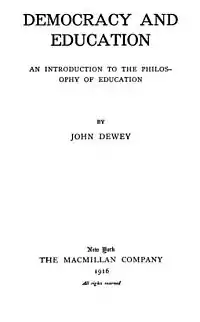Manifesto
A manifesto is a published declaration of the intentions, motives, or views of the issuer, be it an individual, group, political party or government.[1][2][3][4] A manifesto usually accepts a previously published opinion or public consensus or promotes a new idea with prescriptive notions for carrying out changes the author believes should be made. It often is political or artistic in nature, but may present an individual's life stance. Manifestos relating to religious belief are generally referred to as creeds.

Etymology
It is derived from the Italian word manifesto, itself derived from the Latin manifestum, meaning clear or conspicuous. Its first recorded use in English is from 1620, in Nathaniel Brent's translation of Paolo Sarpi's History of the Council of Trent: "To this citation he made answer by a Manifesto" (p. 102). Similarly, "They were so farre surprised with his Manifesto, that they would never suffer it to be published" (p. 103).[5]
References
- Merriam-Webster online dictionary definition of Manifesto Archived August 8, 2012, at the Wayback Machine.
- "Archived copy" (in German). Archived from the original on September 12, 2013. Retrieved September 14, 2013.CS1 maint: archived copy as title (link), article on "Wahlprogramm", literally "election programme".
- Dictionary.com definition of Manifesto Archived August 6, 2012, at the Wayback Machine.
- David Robertson, The Routledge Dictionary of Politics, Edition 3, Psychology Press, 1890 p. 295 Archived April 25, 2016, at the Wayback Machine, ISBN 0415323770, 9780415323772
- Oxford English Dictionary
External links
- Manifestos.net
- 100 Artists' Manifestos. Danchev, Alex. London: Penguin. 2011. ISBN 9780141191799. OCLC 660519141.CS1 maint: others (link)
- British political party manifesto archives, 1900–present: Labour, Conservative, Liberal/SDP/Liberal Democrat
